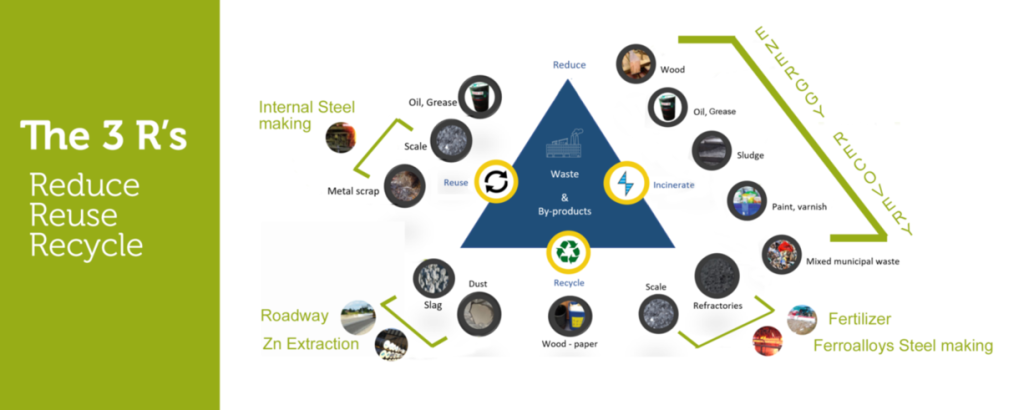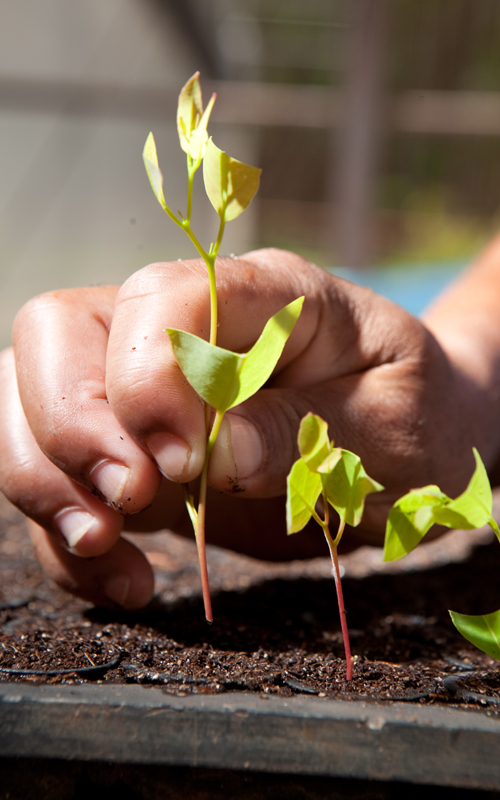Reusing our waste preserves natural resources
Global Recycling Day is an opportunity to take stock of Vallourec’s actions to promote a circular economy. The reuse of our waste is central to this proactive policy, launched a few years ago. The Group’s recycling rate has gradually increased to reach 96% at the end of 2019. This is the result of all the initiatives implemented by teams across all our regions.
The circular economy, a change of perspective
The circular economy aims to change our model by ensuring natural resources are used rationally and by limiting the environmental impact at every stage of a product’s life. The recycling and reuse of some people’s waste, which becomes a raw material for others, is part of this process.
Within the framework of the “By-products” Program implemented in the Group, waste, previously considered a fatal consequence of production, is now seen as a resource to be exploited.
What is Global Recycling Day?
Global Recycling Day is an initiative of the BIR (Bureau of International Recycling).
This represents more than 760 companies, members of the private sector and 37 national associations, in more than 70 countries. Together, these members form the largest international recycling federation.
Launched in 2018, this day aims to raise public awareness of the importance of recycling to preserve natural resources and, more generally, our planet.
How to contribute to this new model?
In 2019, the Group generated 669,000 metric tons of all kinds of waste through its operations.
Each category of waste is subject to specific monitoring at each of our sites, with the aim of reducing it.
In 2019, 93.7% of waste (vs 91.9 % in 2018) was recycled into by-products*, and just over 2% into energy.
Based on the “3 Rs principle”, for “Reduce, Reuse, Recycle”, the “By-Products” program identified the main levers of progress. These levers are described below with some concrete examples of Group achievements, illustrating the dynamic commitment of our employees in this area.

Reduce waste volumes
A study is underway to reduce the use of plastic in the production of protectors by using bio-based plastics, which would limit our impact on the environment.
Recyle
Some waste can be reintroduced or reused, either in our processes or externally.
Our VTS site in Brazil has set up a protector recycling system at customer sites. Inspected, cleaned, and reconditioned, they can then be reused. Also in Brazil, VSB uses blast furnace sludge as a source of soil enrichment for eucalyptus forests and as a raw material for the ceramic industry.
Many sites are also equipped with devices to filter used oils for reuse internally.
In Indonesia, the site reuses 50% of its cutting fluids after a filtering process.
Reuse
Recycling is the most important recovery route for waste specific to our activities.
All sites have a circuit for recycling metal waste produced during production processes in machining (turnings, shavings, etc.), which are handled by channels outside the Group. In Brazil, some types of mining waste are used as raw materials to make interlocking pavers to cover the site’s roads.
Local teams have opened up new waste management avenues: in Youngstown (United States), for example, bad scale is sold to the cement sector (after mixing it with “good” scale). This site has also changed its sludge dewatering practices. The addition of sawdust has reduced the quantities sent for treatment.
Goals for the future


Building on this progress, the Group intends to go even further and reach a recycling rate of 98% by 2025, i.e. a reduction of around 15,000 metric tons of non-recycled waste, in particular by reducing landfills.
This is an ambitious objective, commensurate with Vallourec’s commitments in this area, illustrated in particular by its decision to join the AFEP** initiative in 2017 to promote the circular economy.
*By-product : material created during the manufacturing process of a product that can be recycled by being used as raw material for another production, thus limiting the use of primary raw materials taken from the environment.
* *AFEP: The Association Française des Entreprises Privées (French association of private companies) represents more than 100 of the largest companies operating in France.


